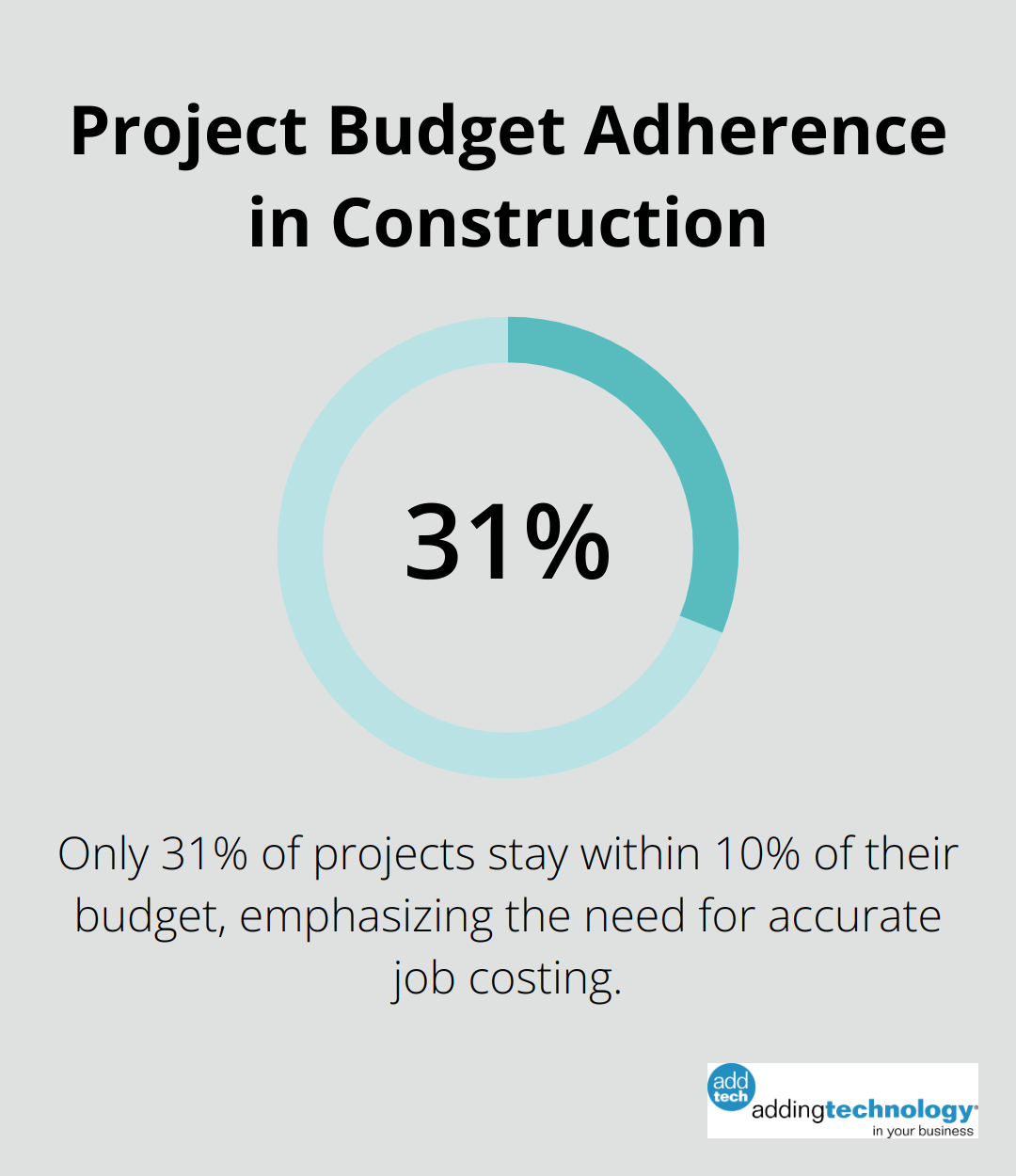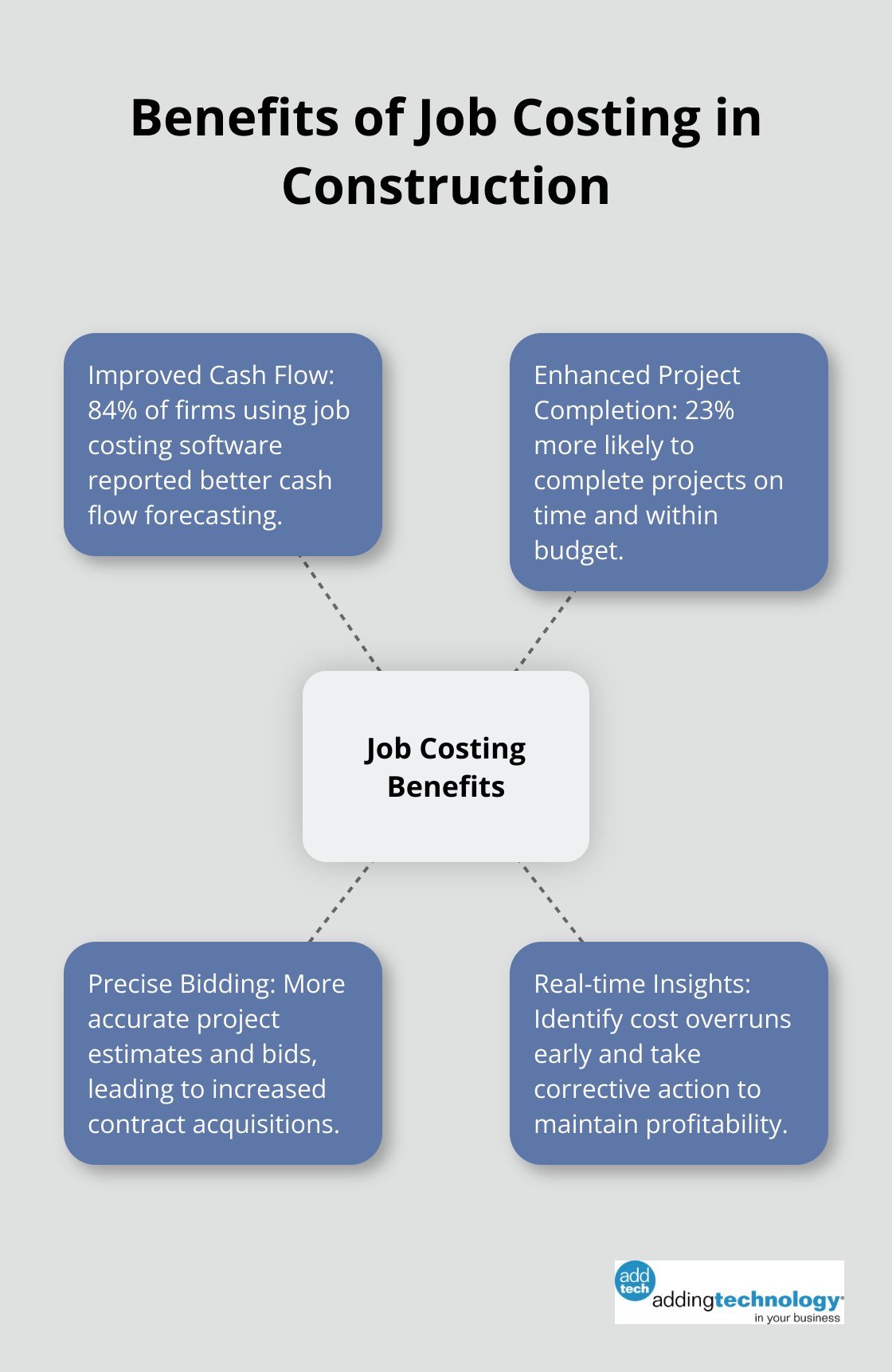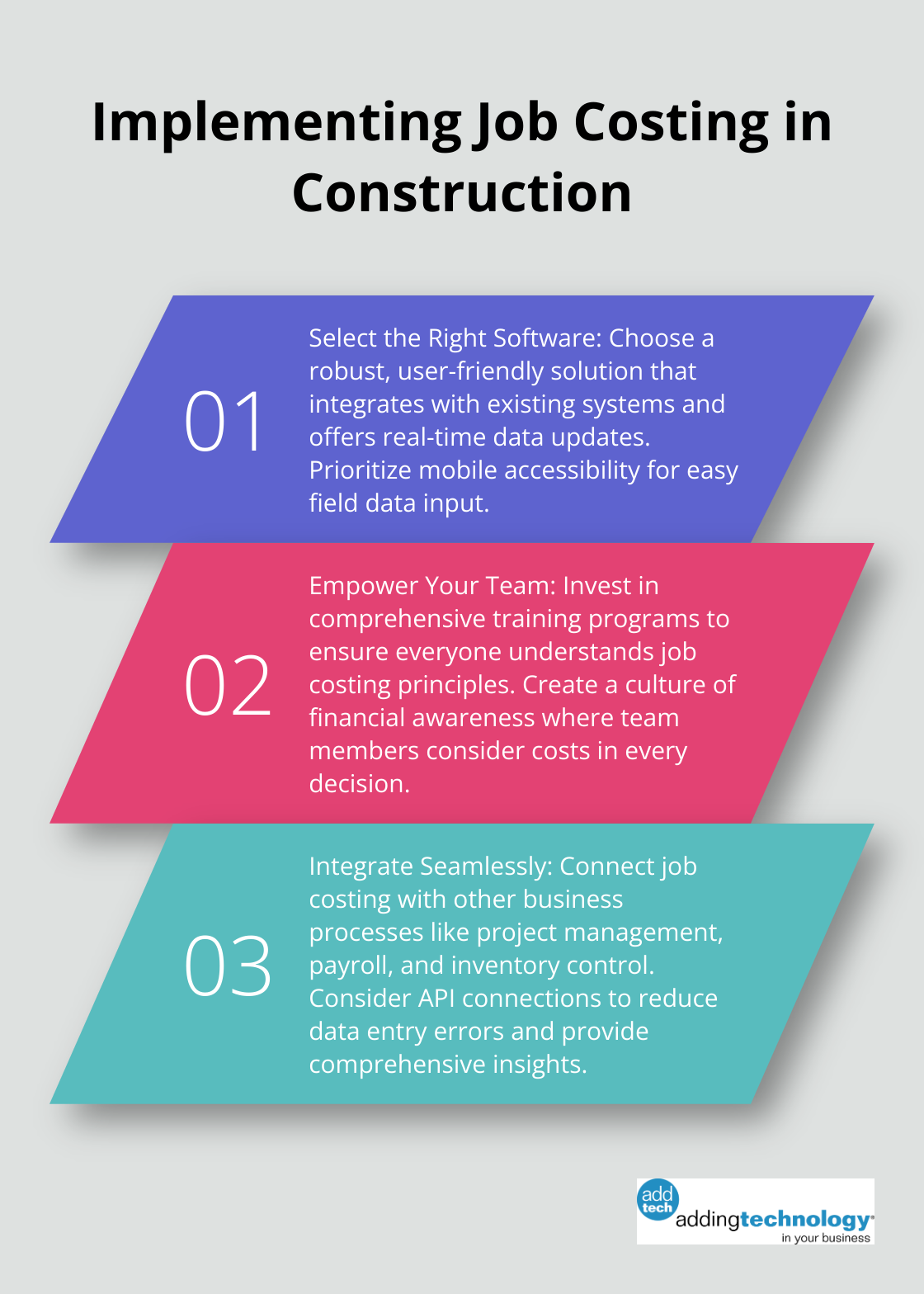
At adding technology, we understand why job costing is important in the construction industry. It’s a critical process that can make or break a project’s financial success.
Job costing allows construction companies to accurately track and allocate costs to specific projects, providing valuable insights into profitability and efficiency.
In this post, we’ll explore the key components of job costing, its benefits, and how to implement it effectively in your construction business.
Job costing in construction is a method to track and allocate costs to specific projects. It serves as a vital tool for construction companies to understand the true cost of each job and maintain profitability. This process transforms a construction business’s financial management by providing detailed insights into project expenses.
Job costing involves three main components:
A study revealed that only 31% of projects stay within 10% of their budget, highlighting the importance of accurate job costing in construction.

Job costing stands out as the ideal method for construction, where each project is unique. Unlike process costing (used in industries with continuous production of identical units), job costing provides a granular view of costs. This detailed approach allows managers to identify inefficiencies and make data-driven decisions.
To implement job costing effectively, construction companies need robust systems for data collection and analysis. Specialized software plays a crucial role in this process. These tools offer benefits such as accurate cost tracking, efficient resource allocation, and streamlined workflow management.
Accurate time tracking is a key aspect of successful job costing. Mobile apps that allow workers to log their hours directly from the job site can reduce errors and administrative overhead.
Job costing isn’t just about tracking costs – it’s about using that information to improve your business. Regular review of job cost reports can help you:
The insights gained from job costing can lead to more accurate bids, better resource allocation, and improved overall financial performance. As we move forward, we’ll explore the specific benefits that effective job costing can bring to your construction business.
Job costing transforms the accuracy of project estimates and bids. Construction firms create more precise bids by analyzing historical data from similar projects. This precision is vital in a competitive market.
A mid-sized construction firm implemented detailed job costing and improved their bid accuracy by 22% over six months. This improvement led to a 30% increase in successful contract acquisitions.
Job costing significantly improves cash flow management. Companies anticipate cash needs and avoid shortfalls by tracking expenses in real-time. This proactive approach reduces the risk of project delays due to financial constraints.
A Sage survey revealed that 84% of construction firms using job costing software reported improved cash flow forecasting. This improvement led to a 20% reduction in late payments to subcontractors and suppliers.
Job costing is a powerful tool for enhancing project profitability. It allows managers to identify cost overruns early and take corrective action. This real-time insight can make the difference between a profitable project and a loss-making one.
A commercial construction company using a comprehensive job costing system identified a 12% cost overrun in labor expenses midway through a project. They adjusted their workforce allocation and brought the project back on budget, saving $150,000 in potential losses.

The most significant benefit of job costing is its impact on future decision-making. The wealth of data collected through job costing provides invaluable insights for strategic planning.
McKinsey & Company reported that construction firms leveraging data-driven insights from job costing were 23% more likely to complete projects on time and within budget compared to those not using such systems.
Companies can identify their most profitable types of projects, optimize resource allocation, and make informed decisions about which contracts to pursue through job costing data analysis. This strategic approach leads to long-term growth and sustainability in the competitive construction industry.
The next step is to understand how to implement job costing effectively in your construction business. Let’s explore the practical aspects of choosing the right software, training your team, and integrating job costing with other business processes.
The foundation of effective job costing is robust software. Look for a solution that integrates with your existing systems and offers real-time data updates. Studies indicate that over 70% of construction firms struggle with job costing, leading to inefficiencies and potential financial losses.
When you evaluate options, prioritize user-friendliness and mobile accessibility. Your team should input data easily from the field. Cloud-based solutions offer real-time updates and remote access, which are essential in today’s dynamic construction environment.

Software alone doesn’t suffice. Your team must understand and embrace job costing principles. Invest in comprehensive training programs. Ensure everyone, from project managers to site workers, understands their role in the job costing process.
Create a culture of financial awareness. Encourage your team to consider costs in every decision they make.
Job costing shouldn’t exist in isolation. Integrate it with other business processes like project management, payroll, and inventory control. This integration provides a holistic view of your projects and business.
Consider API connections to link your job costing system with other software tools. This approach can reduce data entry errors and provide more comprehensive insights.
Accurate data is the lifeblood of effective job costing. Implement standardized procedures for data collection across all projects. Use digital tools (like mobile apps) for time tracking and expense reporting to minimize errors and delays.
Regular audits of your data collection processes can help identify and correct issues early.
Job costing implementation is an ongoing process. Monitor your system’s performance regularly and gather feedback from users. Try to identify bottlenecks or areas where efficiency can improve. Update your processes and software as needed to keep up with industry best practices and technological advancements.
Job costing stands as a cornerstone of successful construction management. It transforms businesses by providing unparalleled insights into project finances and overall company performance. The importance of job costing in construction manifests through accurate bidding, efficient resource allocation, and increased profitability.
Companies that master this practice often experience improved cash flow, better client relationships, and sustained growth. They position themselves to navigate market fluctuations and strategically seize future opportunities. Job costing equips construction firms with the tools to make data-driven decisions, optimize operations, and consistently deliver projects on time and within budget.
We at Adding Technology specialize in helping construction businesses implement effective job costing systems. Our expertise in construction accounting and financial management can help streamline processes, ensure compliance, and provide the insights needed to drive business forward. Job costing is more than a financial practice; it’s a strategic approach that can revolutionize your construction business.








At adding technology, we know you want to focus on what you do best as a contractor. In order to do that, you need a proactive back office crew who has financial expertise in your industry.
The problem is that managing and understanding key financial compliance details for your business is a distraction when you want to spend your time focused on building your business (and our collective future).
We understand that there is an art to what contractors do, and financial worries can disrupt the creative process and quality of work. We know that many contractors struggle with messy books, lack of realtime financial visibility, and the stress of compliance issues. These challenges can lead to frustration, overwhelm, and fear that distracts from their core business.
That's where we come in. We're not just accountants; we're part of your crew. We renovate your books, implement cutting-edge technology, and provide you with the real-time job costing and financial insights you need to make informed decisions. Our services are designed to give you peace of mind, allowing you to focus on what you do best - creating and building.
Here’s how we do it:
Schedule a conversation today, and in the meantime, download the Contractor’s Blueprint for Financial Success: A Step by-Step Guide to Maximizing Profits in Construction.” So you can stop worrying about accounting, technology, and compliance details and be free to hammer out success in the field.